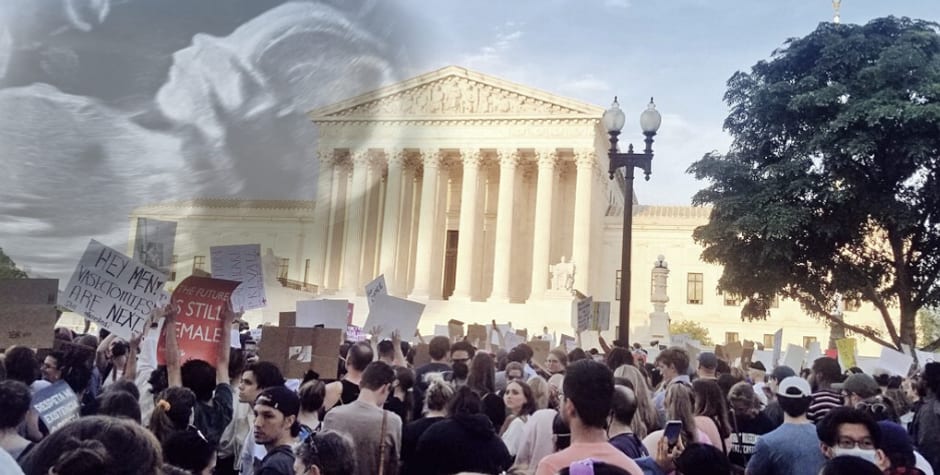
A US Supreme Court draft ruling on abortion was leaked to the press. Some people are worried that the right to abortion might be challenged. Interview for Valeurs Actuelles with Grégor Puppinck, PhD in law, Director of the ECLJ. The ECLJ intervened as amicus curiae in the case before the US Supreme Court.
Does this proposed Supreme Court ruling remove the right to abortion?
No. This draft ruling does not declare abortion unconstitutional, as for example the Polish Constitutional Court did in 2020 regarding eugenic abortion: it returns the power to decide on this issue to the people and their representatives, as was the case before the 1973 Roe decision. With such a decision, the US states would no longer be obliged to legalise abortion, but neither would they be obliged to repeal it. In practice, quite a few states would have to make abortion subject to stricter conditions, including time limits, as abortion is currently a right up to the point of foetal viability, i.e. around 24 weeks. 26 of the 50 states intervened in this case to ask the Court to overturn the old Roe of 1973 and Casey of 1992 decisions, which had created a constitutional right to abortion, and to send the issue back to their jurisdiction.
How did the judges reach this draft decision?
The draft decision - which is intellectually very rigorous – surgically investigates the former Roe and Casey decisions. It is an uncompromising, 99-page analysis that exposes the factual and legal errors in those judgments and, more importantly, denounces the "abuse of judicial authority" by which the judges "short-circuited the democratic process" by imposing their own ideas on everyone.
The text recalls that the Court must exercise judicial restraint: its role is to apply the Constitution, not to create new rights and obligations that it does not contain. This is an elementary requirement of the separation of powers: the judge must not take the place of the legislator.
As for the factual and legal errors of the Roe and Casey precedents, the draft judgment exposes a whole series of them, but the most important one concerns the notion of privacy and personal autonomy, which, according to the text, cannot justify abortion, because this practice involves the life of a human being, a third party.
In so doing, the draft judgment strikes a blow at a symbol of the Western individualist revolution: the assertion in Casey that "At the heart of liberty is the right to define one’s own concept of existence, of meaning, of the universe, and of the mystery of human life." This statement - vague and general - had served as the pseudo-legal justification for the assertion of a right to abortion, and other "new rights".
To this assertion, the draft judgment responds with a lucid reminder of reality: "While individuals are certainly free to think and to say what they wish about “existence,” “meaning,” the “universe,” and “the mystery of human life,” they are not always free to act in accordance with those thoughts. License to act on the basis of such beliefs may correspond to one of the many understandings of “liberty,” but it is certainly not “ordered liberty".” In other words: individual beliefs and desires do not create rights. The frequent reference to the constitutional notion of 'ordered liberty' expresses a fundamental philosophical position: neither liberty, nor the 'licence' to do anything, are protected by the Constitution, but only liberty which is ordered to the Good.
Significantly, the Judges found that the state of Mississippi, whose case is pending, has numerous "legitimate interests" in reducing the legal time limit for abortion on demand to 15 weeks. Among these "legitimate interests", the text cites "respect for and preservation of prenatal life at all stages of development, … the protection of maternal health and safety; the elimination of particularly gruesome or barbaric medical procedures; the preservation of the integrity of the medical profession; the mitigation of fetal pain; and the prevention of discrimination on the basis of race, sex, or disability". The Judges placed particular emphasis on the "barbaric" nature of late-term abortion.
At the end of this analysis, the old Roe and Casey decisions are literally destroyed.
What would be the outcome of this proposed ruling, if it were upheld?
First of all, the Mississippi law that gave rise to this case would be declared constitutional. This should come as no shock to anyone in France, where Parliament has just extended the legal time limit for abortion on demand from 12 to 14 weeks.
This ruling should also lead to the validation of a series of laws reducing access to abortion that are currently being challenged in court. These include laws prohibiting selective abortion based on a child's gender, race or disability.
Next, the Biden administration will get hold of this issue to remobilise its troops and try to bypass the Supreme Court by imposing abortion on the states, this time through a vote of the Congress. The fraudulent publication of this draft ruling is probably a desperate attempt to influence the Judges by causing a global scandal. But the Judges have already responded in advance to this pressure by stating that they do not decide on the basis of public opinion, but only on the basis of the text of the Constitution, constitutional history and legal precedents.
Finally, if the contents of this draft ruling were indeed upheld, the political debate on abortion would be reopened in every state in the United States. With the Roe/Casey bolt broken, giving power back to legislators, the great abortion battle would then only begin.
With this proposed ruling, is the US taking a completely isolated direction in the West?
No, on the contrary, and this demonstrates the excessive nature of the criticism levelled at it. Indeed, like this draft judgment, the European Court of Human Rights has consistently held that the right to respect for private life and personal autonomy does not confer a right to abortion, and that states may regulate abortion in either direction, depending notably on their cultural differences.
The Supreme Court and the ECHR would thus find themselves holding a shared position.













